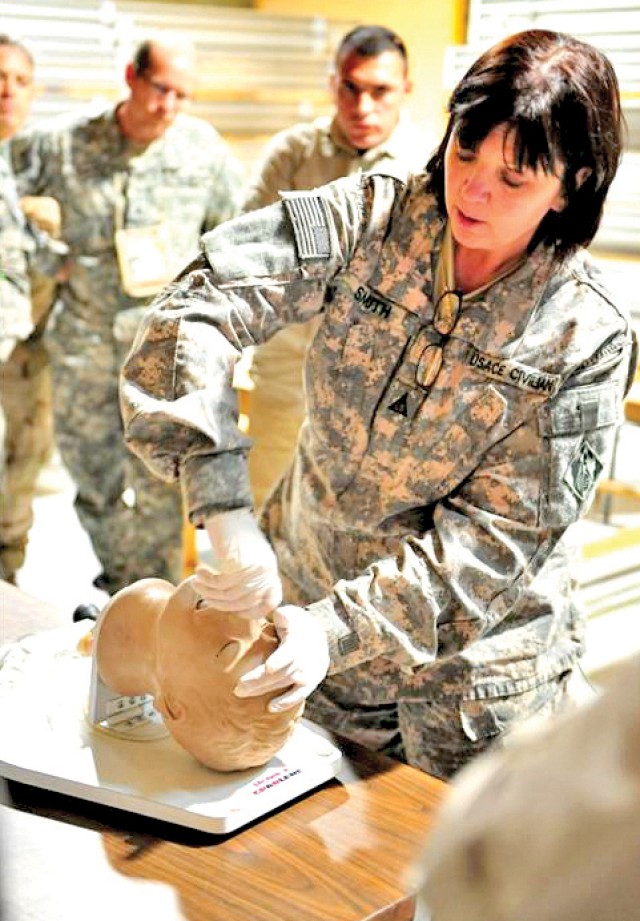WIESBADEN, Germany - Barbara Smith says she never really feared for her life.
The earthquake, the nearby explosions, the armed security everywhere she went - it wasn't the average experience for an occupational health nurse.
"But that's what I did the training for," said Smith who served for six months in northern portions of Afghanistan with the U.S. Army Corps of Engineers.
The landlocked, third-world country presented scores of challenges for Smith who said she cringed as she watched local national construction workers drive heavy machinery without any shoes on, carry buckets full of cement to a site for the foundation of a new hospital and climb onto scaffolding that looked more like death-defying Cirque du Soleil acts.
In Afghanistan, Smith worked as the occupational health nurse for the USACE. Occupational health nurses are registered nurses who independently observe and assess the worker's health status with respect to job tasks and hazards. Using their specialized experience and education, these registered nurses recognize and prevent health effects from hazardous exposures and treat workers' injuries and illnesses. The position meant she had to evaluate and inspect the jobs people did and the safety measures they took in order to prevent illness and injuries in the workforce.
According to the U.S. Army Corps of Engineers Afghanistan Engineer District-North web page, the AED-North is committed to helping build Afghanistan's national capacity. The mission includes providing sustainable development projects for the Afghan people that ultimately promote a stable future for Afghanistan.
On average, Smith's office saw about 150 civilian workers a month dealing with issues such as colds, coughs, sports injuries and referrals for vaccines.
"They'd never had a nurse over there before," said Smith, who took time off from her position with the U.S. Army Public Health Command Region as the U.S. Army Garrison Wiesbaden occupational health nurse to work for the USACE.
"Remember how big the H1N1 was here and in the States'" said Smith. "Think how big (an issue) it is in a third-world country."
Smith arrived in Afghanistan in October 2009.
In the airport she was surrounded by people screaming in a language she didn't understand. She waited for someone to recognize her.
She followed her escort to an armored vehicle outside. She rode in the back seat. The windows were so dirty she could barely see out of them. The ride went fast.
"You don't stop driving in Afghanistan," said Smith referring to the driving tactics. "You never know what will happen to you."
While Smith did not handle occupational health for local nationals, she monitored workers compensation claims for contractors.
About 79 percent of AED contract awards are being awarded to Afghan or Afghan-American firms, a realization of the corps' goal to place more work with Afghan nationals and firms.
But in a regular setting where Smith dealt with claims of trips, slips and falls, in Afghanistan she dealt with kidnappings and improvised explosive devices.
"I had to deal with trying to track the issue to make sure the contracting companies filed the claims," said Smith.
A simple trip to the medical clinic included dressing in her desert camouflage uniform, boots and Kevlar, walking into a container with armed guards, crossing a street and walking down a corridor flanked by barbed-wire fencing into another enclosed container.
"It was a 20-minute process and walk to get to the clinic," said Smith.
Aside from the obvious security issues of working in a war zone, Smith also dealt with supply issues, medical oversight, creating a memorandum of understanding and writing up policies and procedures that didn't exist before she arrived. Smith was also put in charge of combat life-saver training.
"It's kind of like what I do now (at U.S. Army Garrison Wiesbaden) plus morphed into a lot more," said Smith.
For Smith, the time went fast. Disbursement of vaccines, training and get-togethers with coworkers - everyday was busy, said Smith.
"I'm just so happy to have accomplished everything I set out to do," said Smith, who left Afghanistan having set up a private office, a database for medical tracking, logistical support for medical supplies, memorandums of understanding, standard operating procedures and taught CLS to more than 100 personnel.
"Just think how long it takes to get things to happen here (in noncombat zones). There I just started with a desk and a chair," said Smith. "I went in, did my job and came home."


Social Sharing